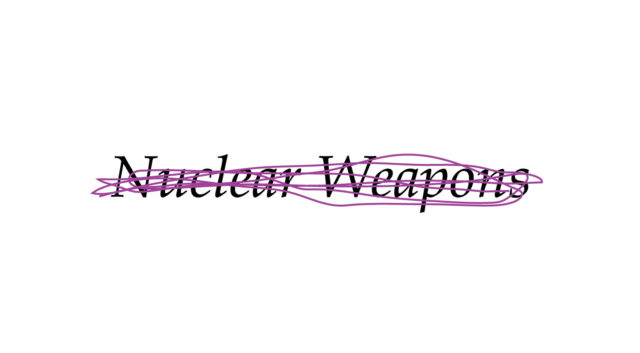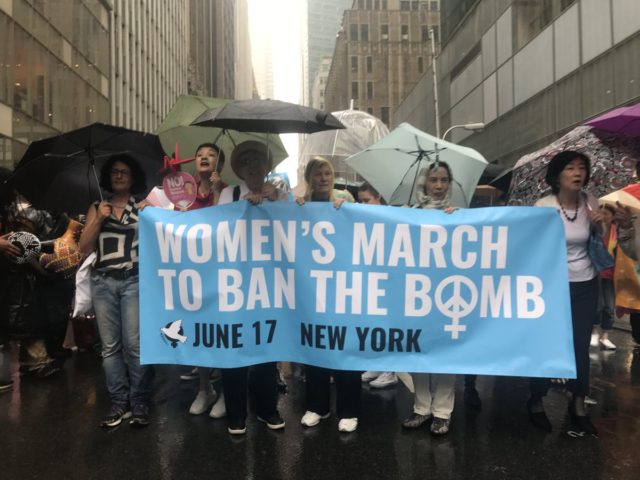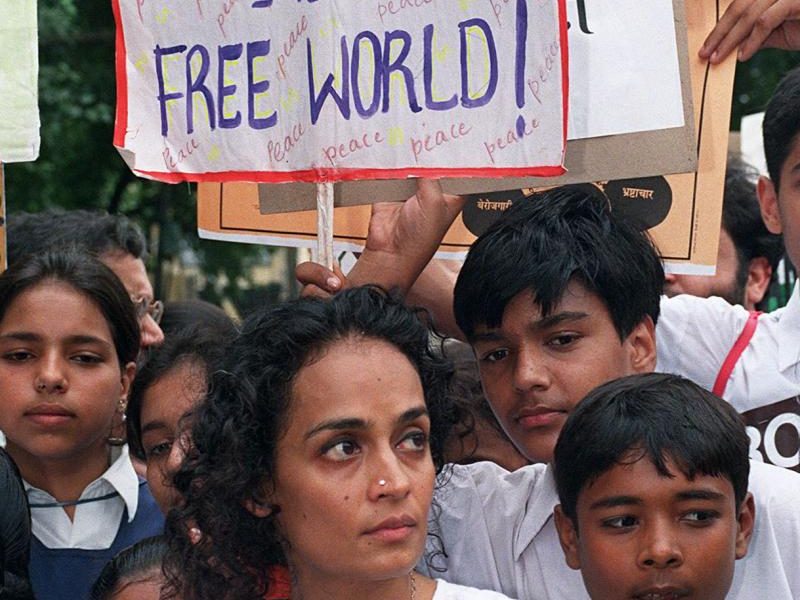
During crucial moments in history, the world asks us to demonstrate our virtues and wear our hearts on our sleeves. Not everyone is up to the task. But when true courage does manifest, it is magically infectious. Other people will absorb it and it will crystallize inside them.
In times such as these — when it is easier to troll thy neighbor in 140 characters behind a computer screen — where can we find real courage to navigate this topsy-turvy world?
Indian author Arundhati Roy is renowned for her novels The God of Small Things and now The Ministry of Utmost Happiness, celebrated fictions that unabashedly expose the harsh, cross-cutting realities in her homeland: gender, caste, religion, nationalism. To her fans, Roy’s poetic prose exemplifies the artist’s courage to articulate injustices found in the world. But people forget that Roy is also a masterful essayist, audacious enough to take on the baddest of the bad: nuclear weapons. Her essay “The End of Imagination,” a scathing critique of India’s nuclear weapons program, was first published May 1998 in India, two months after it conducted the Pokhran nuclear tests that cemented its place in the global nuclear club. In this essay, Roy picked apart the importance of nukes elegantly, and most importantly, courageously.

In an interview in 2014, Roy mused on her non-fiction work, noting that there was a point she swore to never write anything with a footnote again since it always pulled her into trouble. But as everyone knows — even herself — speaking the truth cannot be helped. “The End of Imagination” roiled India and turned Roy’s reputation from an admired author to an amateur agitator, simply because she wore her heart on her sleeve and spoke her truth: “the nuclear bomb is the most antidemocratic, antinational, antihuman, outright evil thing that man has ever made.”
Only a handful of people know Roy’s nonfiction (a lot of people anticipated her latest novel like she hasn’t written anything in 20 years), and probably even fewer people are aware of the dangerous nuclear waltz India and Pakistan have been dancing over past several decades. Seventeen days after India’s Pokhran test in 1998, Pakistan followed with its own series of nuclear tests. Since then, both countries have been on the edge of a nuclear exchange as they improve and expand their nuclear capabilities. Nuclear experts fear that if the simmering tension between the two are left unchecked, crises could escalate conventional skirmishes into a nuclear confrontation. Both countries have already shared a handful of crises in a span of thirty years that could have resulted in nuclear warfare. To Roy, this is obviously insane; the rift between the two countries cannot be solved by pointing missiles at one another. As Roy simply put, “Though we are separate countries, we share skies, we share winds, we share water…any nuclear war with Pakistan will be a war against ourselves.”

The most compelling part of Roy’s critique — where her courage truly shines — is her appeal to take personal offense to the existence of nuclear weapons. Pushing aside that the dangers of nuclear weapons is an obvious one (“Never mind it has been said before.”), she compels her readers to feel directly insulted that governments around the world have bestowed enormous value on these bombs. The price paid is a deep psychological loss that transcends all politics: the end of imagination for a future with total peace and complete freedom. At one point, she asks a question that is left unanswered even today: “Who the hell is the prime minister to decide whose finger will be on the nuclear button that could turn everything we love…to ash in an instant?” This isn’t just India’s problem: today we are all wondering whether President Trump could ever resist pressing the nuclear button himself, if the opportunity presents itself. The terrible grip of nuclear weapons over people’s hearts and minds is timeless, and knows no borders.

It is easy to say that writers — all artists for that matter — have no real place to talk politics, especially policies concerning national security. They don’t have the expertise, they don’t understand what really happens at the policy table, so they should just stick to what they’re best at: art. But it is Roy’s gift as a storyteller that gave her the power to break the facade of authority, and dismantle the logic behind unquestioned systems of power. With a flourish of a pen, Roy described with heartbreaking accuracy how nuclear weapons dehumanizes us all, even though decisions to keep and use them are bestowed only to a select few. This opinion does not make her especially unique among writers (she finds the term writer-activist awkward, like sofa-bed — it cannot make up its mind on what it wants to be). If anything, Roy’s views stance is not a grandiose political act, but a deeply human reaction: why do these weapons exist? Are they worth more than my life? Or yours?
It is now 2017 — Roy is out with new fiction and the world continues to live under the shadow of nuclear threat, with occasional missile tests from North Korea and presidential tweets about a renewed arms race. But Roy’s words in “The End of Imagination” has kindled a fire that has lasted twenty years. And this fire rages on, embodied in the latest round of efforts to recognize the catastrophic humanitarian consequences of nuclear weapons. Through the persistence and courage of civil society — with many women at the helm — countries are now meeting in the United Nations to negotiate a treaty banning nuclear weapons. Initially deemed by the expert community impossible, a ban treaty is within reach that could dispel the master narrative that nuclear weapons are essential to global stability. The discussion around the ban is delightfully bold, departing from sterile talk about security and venturing into a more personal space, particularly the way nuclear weapons production and use have exploited and victimized women and people of color. On top of it all, protests and vigils around the world, including the one held in New York City this month, are trying to mobilize ordinary people to take ownership of this issue. To take a stand against the baddest of the bad in a time as crazy as the one we’re all living in right now.
Perhaps Roy’s courage rubbed off the page and infected us after all.


